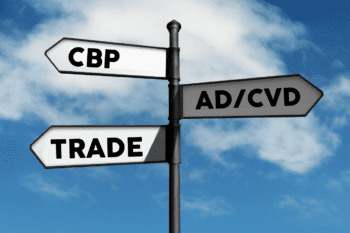By: Jennifer Horvath, Senior Associate
In the last 12 months, Anti-Dumping/Countervailing Duty (AD/CVD) orders against countries other than China are increasingly on the rise. The U.S. has continued to follow a dramatic five-year trend of involving multiple new countries such as Vietnam, Turkey, and Korea. China has historically been the country most likely to be the subject of an AD/CVD order (China comprises 39.77%. of all orders). China came to dominate AD/CVD orders between 2007-2011, comprising 71% of all orders. The last five years have marked a significant trend away from the domination of Chinese origin products in AD/CVD cases, which should alert U.S. importers that they can no longer afford to assume that Chinese products alone are likely to be the subject of an AD/CVD order.
In the last 5-years (2012-2016), China only comprised 38% of all orders, which is slightly lower than the historical average. This decline has continued into 2016 and thus far, Chinese product orders make-up only 33% of all orders. As China declines as the primary country subject to the orders, orders against other countries are increasingly on the rise. The 10 countries subject to the most orders for the last 5 years is a significant trend away from the prior 5-year period (2007-2012) when 4 of the top 10 countries had no orders.
Notable increases include, Vietnam, Korea, Turkey, Taiwan, and Indonesia, wherein the orders of the last 5 years (2012-2016) represent more than 20% of all orders ever brought against each individual country. Vietnam, Turkey, and Korea are particularly noteworthy, as most of the orders brought against products from these three countries were executed in the past five years. For example, Vietnam is at 58%, Turkey at 50%, and Korea at 39% of all orders ever brought for each country. New types of orders for products from these countries include: Welded Line Pipe, Steel Nails, and Oil Country Tubular Goods. The last 12 months indicates that this trend is likely to continue, as all 3 countries have had 2 orders against them.
Taiwan and Indonesia are also notable as countries emerging as standouts on the AD/CVD scene, as 32% of all orders ever brought against Taiwan, and 23% of all orders every brought against Indonesia, were brought in the last 5 years, and both have had orders against them in the last 12 month period. India is also likely to continue to represent a sizeable portion of orders, as 15% of all orders ever brought against India occurred in the last 5 years and it has had 2 orders imposed against it in the last 12 months. Finally, while, Japan and Mexico have not had any orders in the last 12-month period, 20% of all orders against Mexico occurred in the last 5 years, as well as 19% of all orders against Japan.
With the recent uptick in non-Chinese product orders, there has also been an increase in orders against products that affect multiple countries. Over the past few years, orders against products that involve multiple countries have significantly increased in terms of the number of countries affected. This marks a distinct change from the prior 5-year period when the vast majority of orders against non-China countries were single orders that did not involve any other country. Products recently the subject of multi-country orders included:
- Oil Country Tubular Goods (2014, 7 orders against 5 countries).
- Non-Oriented Electrical Steel (2014, 8 orders against 5 countries); and
- Steel Nails (2015, 6 orders against 5 countries).
Thus far, this trend has continued into 2016 orders. The 2016 orders have been dominated by orders against the following products:
- Uncoated Paper (7 orders against 5 countries) and
- Polyethylene Terephthalate Resin (6 orders against 4 countries).
Given the changing AD/CVD landscape, it is critical that companies keep an eye out for products such as these, as AD/CVD orders now seem much more targeted towards products that that may be imported from several countries. Overall, importers will need to broaden the scope of reviewing AD/CVD orders potentially subject to their goods and also accordingly review their sourcing from these countries.

























